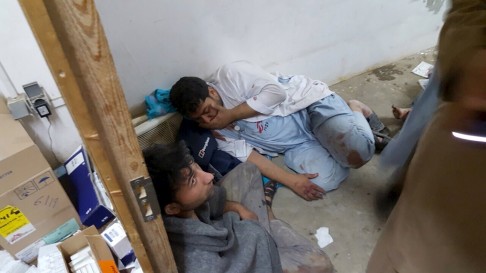
When apologies for hospital air strikes are not enough
Sherif Elgebeily says the bombings of medical facilities in Afghanistan and Yemen indicate yet more state violations of humanitarian laws and appear to be war crimes

For the second time in less than a month, Médecins Sans Frontières (MSF) is coming to terms with the fallout from errant air strikes, first by US forces in Afghanistan and, this time, allegedly by Saudi forces in Yemen. On both occasions, MSF clearly and repeatedly relayed the coordinates of their locations to all parties. The strikes, then, seem deliberate and in clear violation of international humanitarian law; the bombings appear to be war crimes.
Article 8(1) of the Rome Statute of the International Criminal Court is unequivocal in its condemnation of "intentionally directing attacks against personnel [and] installations … involved in a humanitarian assistance" as part of an international armed conflict. While the Rome Statute is arguably an international treaty, rather than customary law which is applicable upon states irrespective of whether they have signed and ratified it, international humanitarian workers are substantially protected by the Geneva Conventions of 1949, which are universally applicable. In short, there is no escape from the wrongful act.
Despite an apology by US President Barack Obama for the attack that killed over 20 in Kunduz, there is yet to be a transparent investigation. On Yemen, there was an admission of a "mistake" but the Saudi-led coalition has subsequently denied responsibility. Rumours are circulating that MSF improperly relayed its coordinates in Yemen, and that the targeted facilities in Afghanistan were under the control of enemy combatants and therefore lost their protected status under the laws of war.
Such arguments are unconvincing. Even in the event that a protected site is being used in such a way, under the Geneva Convention for the Amelioration of the Condition of the Wounded and Sick in Armed Forces in the Field, the inviolability of medical installations may cease "only after a due warning has been given". There is no indication that this happened.

The MSF facility in Kunduz was the only functional hospital in the area and in 2014 alone provided life- and limb-saving trauma care to over 20,000 patients in almost 6,000 surgeries; its hospital in Yemen, which served an area of 200,000 people, treated 150 emergency cases per week, but is now 99 per cent destroyed.
The knock-on effect on the populations that relied on these free, equal-access facilities cannot be overstated. Justice and law are being sacrificed by nations in the pursuit of their end goals.
Dr Sherif Elgebeily is a part-time lecturer and assistant research officer at the Centre for Comparative and Public Law, University of Hong Kong